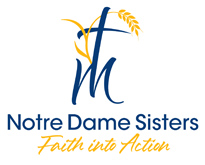Sr. Celeste Wobeter, ND Shines a Light on the Global Issue of Human Trafficking
by Sr. Celeste Wobeter, ND
Human trafficking is a major world crime, second highest to drug trafficking; however, sex trafficking is the most prevalent form of human trafficking in the U.S. Sex trafficking is a high profit, low risk business where the commodity – the human being’s body – can be sold over and over, unlike a drug, which can be sold only once.
I was once asked, “Why are the Notre Dame Sisters working with human trafficking?” My answer was, “It is an unmet need in our country today.” It’s what we do. When our congregation was founded, its mission focused on the unmet needs of women and children and others who were neglected. The thread of that mission focus continues today more than 400 years later. We continue to address the present unmet needs of our country. It was in 2014 that the Notre Dame Sisters’ Social Justice Committee expanded their goals to include human trafficking, a major unmet need that needed to be addressed. Learning about human trafficking, its prevalence and consequences, was our first goal.
The following are a few facts we learned:
Human trafficking is a growing crime in our country and everywhere in our world. It is the buying and selling of a human being for the personal profit and gain of another through force, fraud, or conversion.
Force: Physically making someone do what the trafficker asks them to do.
Fraud: Making false promises to entice a person to cooperate with the trafficker. This may include providing food, a home, love and acceptance, a good job, security, and other things.
Coercion is the most forceful technique of a trafficker. It is intimidation to gain the cooperation of the person. “If you do this, I will give you privileges” or “If you do not do this, you will have consequences.” These can include no food, no sleep, physical abuse, or threats to harm their family.
Trafficking is a subtle grooming process that often begins on-line. The trafficker seeks out those who are vulnerable and begins to build a relationship with a child or adult. They gather information about them and their family, assess their vulnerabilities, affirm them, all with the goal of gaining the person’s trust. With this strong friendship bonding, the trafficker can then control and direct the person to sex engagements and/or labor. It’s power control.
I have learned a lot about human trafficking. I learned that it is very prevalent in Omaha, in small cities and towns, everywhere! Over and over, I was shocked and overcome about what I learned. Realizing the Notre Dame Sisters needed other resources to assist us, we invited the Sisters of Mercy and the Servants of Mary to join us. Additional expertise of lawyers, law enforcement, social workers, fundraisers, and others joined our group. Outstanding in their experience and knowledge of human trafficking were FBI agent Anna Brewer and Attorney for Child Exploitation Task Force Stephen Patrick O’Meara. We were one of the first groups in Omaha who addressed human trafficking.
We formulated a Mission Statement for our Coalition on Human Trafficking:
We strive to eliminate human trafficking through awareness and education. With community-based collaboration, we provide information to mobilize people to Realize, Recognize, and Respond to Human Trafficking.
Learning that most sex trafficking happens in hotels and motels, we prepared a training for hotel managers and their staff. Initially we experienced much resistance from hotel/motel managers for fear that this would indicate to the public that they had a problem. However, after a press conference with Mayor Jean Stothert and her urgent request to hotel/motel managers to receive the training, more responded positively. All staff including housekeepers and security were included in the training. Housekeepers are key in observing signs of trafficking in the rooms. Managers were impressed with the professional training and highly recommended the training to other managers in the city. In a short time, our volunteers trained staff personnel in hundreds of hotels and motels in many places in Nebraska and Iowa and beyond. We also did several “Train the Trainer” sessions in both states. Managers often contacted us to return to their hotels/motels to train new personnel and/or refresh the facts about sex trafficking for those who received training earlier.
Doug Peterson, former Nebraska Attorney General, sent a letter of recognition to the Coalition, thanking us for the work we were doing in Nebraska, as well as Iowa Governor Kim Reynolds.
Over the years, many other groups addressing human trafficking evolved. Shelters were established for survivors of sex trafficking. Various organizations focused on education in different areas. As our Mission Statement states, our Coalition believed strongly in collaboration and partnered with Rotary groups, Magdalene Omaha, and many other organizations. To strengthen and expand our education program, in 2022 we joined the Set Me Free Project, another group that provided education on human trafficking. Their focus is on teaching children in schools about trafficking as well as the administration and staff of the schools and the parents of the students. After dialogue we agreed this would be a good partnership and would strengthen both of our programs. Our hotel/motel trainings continue in this program with a vision to expand these nationally. Several of the staff of the Coalition and volunteers continue the work of the Coalition, now part of the Set Me Free Project. I do occasional human trafficking presentations to various groups in the community and serve on the Set Me Free Advisory Board.
The mission of the Notre Dame Sisters – to address unmet needs of the poor and neglected – continues to grow and expand.
